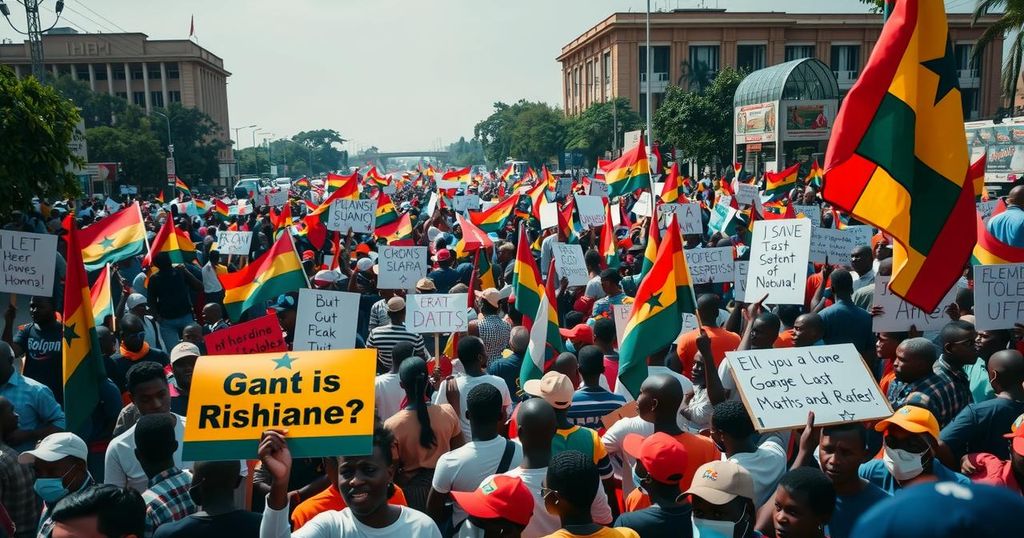Ghana Elections Intensify Threats Against LGBTQ+ Rights Amid Political Maneuvering

In the lead-up to Ghana’s December elections, both main presidential candidates are pledging to intensify measures against LGBTQ+ rights, leveraging widespread anti-LGBTQ+ sentiments. The impending legislative bill poses stringent penalties for LGBTQ+ identity and advocacy, potentially deepening the persecution of sexual and gender minorities, amid a backdrop of religious and societal animosity towards homosexuality.
Ghana’s LGBTQ+ community is faced with a dire predicament as the upcoming general elections unveil a concerning trend among the leading presidential candidates. Both candidates have pledged to intensify actions against LGBTQ+ rights, aligning their electoral strategies with a deeply ingrained anti-LGBTQ+ sentiment prevalent among the electorate. This political maneuvering places the community in a crushing reality as the victor of the December 7 vote may soon have to decide the fate of a contentious bill previously passed by Parliament, which introduces severe penalties for individuals identifying as LGBTQ+. The Supreme Court’s ruling on the bill’s constitutionality is set for December 18, but the political climate indicates a grim outlook for LGBTQ+ rights regardless of the court’s decision.
Candidate Mahamudu Bawumia, representing the ruling party, is unequivocal in his commitment to signing the bill into law, while his principal opponent, former President John Dramani Mahama, despite not explicitly endorsing the bill, advocates for strengthened legal measures against LGBTQ+ activities, condemning perceived Western influences on Ghanaian society. The implications of these political positions create an atmosphere of fear and uncertainty for members of the LGBTQ+ community, who feel abandoned by those positioned to protect their rights.
Existing laws in Ghana already criminalize homosexual acts, but the newly proposed legislation expands the scope of criminality and escalates the consequences, with provisions that could lead to imprisonment for up to five years for same-sex activities and jeopardize the safety of those who do not report suspected LGBTQ+ individuals. Advocates warn that this situation, compounded by the widespread support for the bill among the populace—reflected in surveys showing only 7% tolerance for same-sex relationships—represents a significant threat to the well-being of sexual and gender minorities in Ghana. The narrative has been further fueled by religious leaders labeling LGBTQ+ acts as immoral, contributing to a polarized public consciousness.
Additionally, the law stipulates harsh penalties for friends, family, and property owners who do not disclose information about LGBTQ+ individuals, effectively criminalizing kinship and community support. This creates further avenues for isolation and discrimination within families, driving individuals deeper into the shadows. With notable proponents of LGBTQ+ rights expressing anxiety about their safety and professional prospects, there is a palpable fear that the situation will only worsen should the bill be enacted into law.
International responses have characterized the proposals as alarming, with the European Union denouncing the bill for contravening Ghana’s constitution and international obligations. The potential for the country to lose vital donor funding has prompted discussions about the economic repercussions of such legislation. As the Supreme Court deliberates on procedural challenges regarding the bill, it remains evident that the political landscape offers little hope for the rights of LGBTQ+ individuals, leaving many feeling vulnerable and marginalized ahead of the elections.
The situation in Ghana regarding LGBTQ+ rights is highly contentious, set against a backdrop of entrenched social conservatism and religious opposition to homosexuality. The proposed bill, which seeks to expand criminal sanctions against LGBTQ+ activities, has triggered widespread public discourse about the rights of sexual and gender minorities in the nation. With political parties vying for votes by appealing to anti-LGBTQ+ sentiments, the legislation poses serious implications for both legal frameworks and human rights protections in the country, prompting concerns from human rights advocates and international communities alike. The upcoming general elections are pivotal, as results could significantly influence the trajectory of LGBTQ+ rights in Ghana.
In conclusion, the upcoming elections in Ghana highlight the perilous position of the LGBTQ+ community, with both leading presidential candidates embracing strategies that exploit anti-LGBTQ+ sentiment. The proposed bill poses significant threats to human rights, fostering an environment of fear and discrimination. As the Supreme Court prepares to rule on the bill’s constitutionality, the immediate future remains uncertain, with potential implications for both societal attitudes and international relations. The voices of LGBTQ+ advocates and the global community urge attention and action amid a political landscape that threatens fundamental rights and safety.
Original Source: www.voanews.com







